
September 2018
AAVMC Launches 2018-19 Comparative Data Project
 The AAVMC’s Comparative Data Report (CDR) project is underway. The 2018 data collection effort began on September 5. The CDR is the AAVMC’s largest institutional research project and generates the most comprehensive statistical portrait of academic veterinary medicine that exists.
The AAVMC’s Comparative Data Report (CDR) project is underway. The 2018 data collection effort began on September 5. The CDR is the AAVMC’s largest institutional research project and generates the most comprehensive statistical portrait of academic veterinary medicine that exists.
Data collected through the annual survey process concerning faculty, applicants, student enrollment, tuition, educational debt, finances, and other areas support the production of various reports, infographics, interactive visualizations and presentations.
It helps the AAVMC tell the story of academic veterinary medicine and it helps members more effectively benchmark, plan, and make decisions. It also supports the production of the public data set that helps people and organizations outside our profession better understand the modern operating environment for academic veterinary medicine.
The data collection effort will conclude on Friday, November 2, and the final report will be delivered to participating institutions by December 21, 2018.
Important changes and additions for this year include:
- The survey of institutional scholarships (previously an independent survey) will now become a regular component of the CDR.
- Some changes have been made to improve the accuracy of data collected in the budget and expenditure surveys.
- International colleges are now included on the survey of research funding sources. The survey will now include appropriate categories for these institutions to provide information about research expenditures and grants awarded.
- Survey questions that identify residents who are also pursuing graduate degrees within the colleges are now included.
- Periodic surveys that gather more detailed race and ethnicity data on academic personnel are included. This data is collected every three years.
The AAVMC will host a webinar in early September to review this year’s surveys and answer questions. Staff will also attend the upcoming National Association of Veterinary College Administrators (NAVCA) to continue the dialogue concerning how best to ensure accurate and consistent budget data collection.
In 2019, the AAVMC will continue working with the Council on Education to continue to harmonize the data used by both entities. AAVMC Institutional research personnel are working closely with AAVMC Senior Accreditation Adviser Dr. Sheila Allen to propose changes that will bring the data collection effort into closer alignment with COE reporting requirements. The goal is to develop and implement streamlined and consistent data submission processes that will help reduce demand upon personnel in AAVMC member institutions.
For more information about the program, please contact Senior Director for Institutional Research and Diversity Dr. Lisa Greenhill at 202-371-9195 (ext. 147) or lgreenhill@aavmc.org or Data Analyst/Project Manager Kendall Young at 202-371-9195 (ext. 180) or kyoung@aavmc.org.
Veterinary Scholars Symposium Draws Student Scientists, Mentors
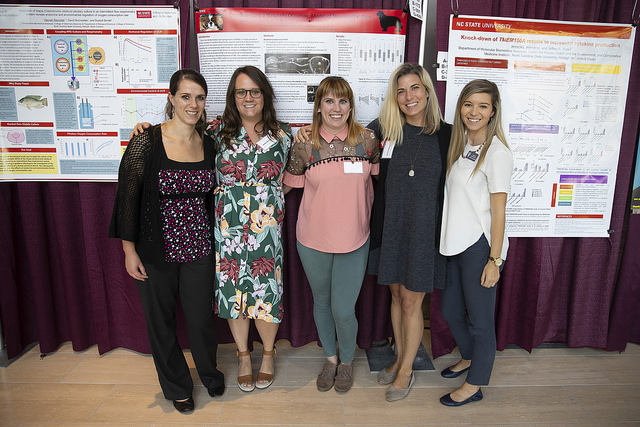
The symposium featured poster presentations from veterinary students.
Almost 700 attendees, including
more than 550 students, gathered August 2-4 at Texas A&M University (TAMU) for the
National Veterinary Scholars Symposium (NVSS), which the AAVMC helped organize
and present.
The NVSS is widely recognized as the premier annual scientific colloquium
showcasing research accomplishments by veterinary students who are completing
summer research internships. The symposium allows students who have completed
research projects to gather with like-minded students, mentors, and other
distinguished research scientists working in academic, government, and private
research settings. The symposium highlights the ways veterinary scientists
advance basic and applied research to support global health and serves as an
incubator for many students who pursue careers in scientific research.
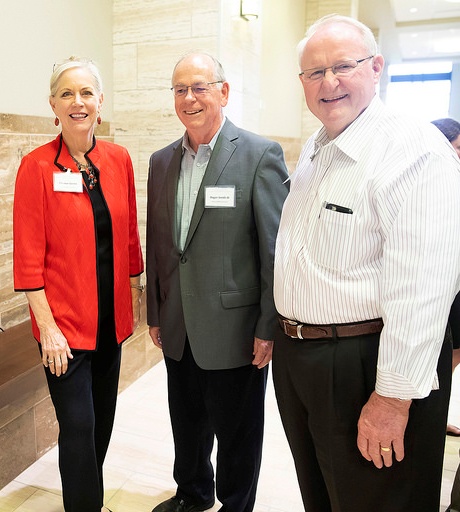
TAMU representatives who helped organize and host the symposium: (from left) Dr. Eleanor Green, veterinary school dean, Dr. Roger Smith and Dr. L. Garry Adams.
It’s always exciting to see the energy and creativity that students bring to
such a wide variety of research,” said AAVMC CEO Dr. Andy Maccabe. “It is particularly rewarding to have the
participation of so many female students, who are traditionally
under-represented in STEM careers. Veterinary medicine is proving to be a
valuable potential pipeline for increasing the number of female scientists in
historically male-dominated science careers.” In a 2014 report, the National Institutes of Health (NIH)
recommended developing innovative programs to encourage female veterinary
students and female veterinarians to join the physician-scientist workforce.
The symposium is the culmination of many student summer research programs,
including the Boehringer Ingelheim Veterinary Scholars Program, multiple
programs funded by the National Institutes of Health (NIH) and colleges of
veterinary medicine. Dr. Roger Smith, professor of veterinary pathobiology, led
the Texas A&M University team in organizing and hosting the symposium; Dr.
L. Garry Adams, senior professor of veterinary pathobiology, chaired the
program committee.
Distinguished plenary speakers were: Dr. Corrie Brown, the Josiah Meigs
Distinguished Teaching Professor at the University of Georgia College of
Veterinary Medicine, who addressed global food security; Dr. Wondwossen A.
Gebreyes, executive director of the Global One Health Initiative at The Ohio
State University, who addressed the role of veterinary medicine in addressing
global capacity; and Dr. Guy Palmer, Regents Professor of Pathology and
Infectious Diseases at Washington State University, who addressed veterinary
medicine as a driver to achieve sustainable development goals.
Poster presentations from veterinary students were featured throughout the
meeting. Two student-focused sessions on professional development focused on
pursuing research careers. Other panel discussions included “Global Health
Research: Focus on Epidemiology,” and “Global Health Research: Focus on
Pathogens.”
Support for the symposium was provided by Boehringer Ingelheim, the National
Institutes of Health, the Burroughs Wellcome Fund, the AAVMC, the American
Veterinary Medical Association, American Veterinary Medical Foundation, Texas
A&M University and the Texas A&M College of Veterinary Medicine and
Biomedical Sciences, the Texas Veterinary Medical Foundation, City of Bryan,
City of College Station, Bryan College Station, and the Society of Toxicologic
Pathology.

Symposium leaders gathered at the conference.
Nomination Cycle for 2018-19 AAVMC Professional Excellence Awards Open September 4 – October 15, 2018
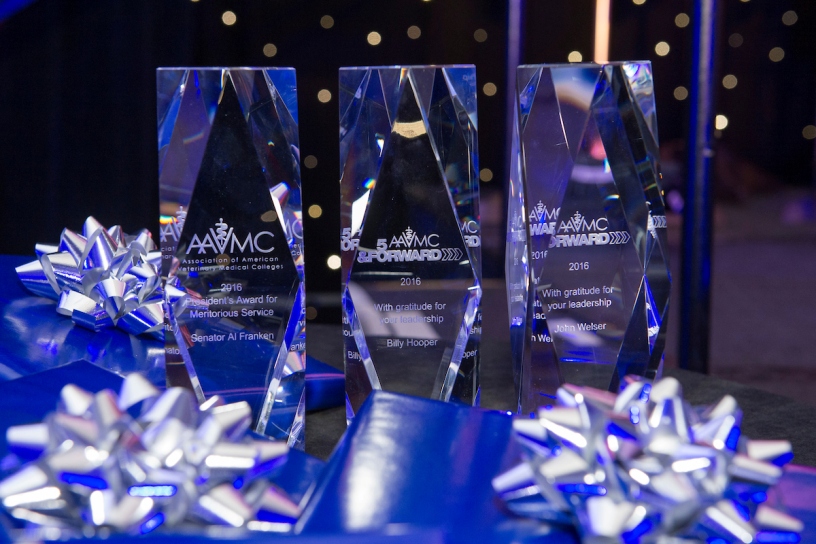 The AAVMC annually presents a series of prestigious awards designed to inspire and recognize professional excellence in teaching, research, service and other areas in academic veterinary medicine. The nomination period is now open for the 2018-19 series of awards, which will be presented during the 2019 annual conference in Washington. The nomination period closes on October 15, 2018. With this year’s annual conference also including an Iverson Bell symposium, this year’s cycle will also include the Iverson Bell Award and the Patricia Lowrie Diversity Leadership Scholarship.
The AAVMC annually presents a series of prestigious awards designed to inspire and recognize professional excellence in teaching, research, service and other areas in academic veterinary medicine. The nomination period is now open for the 2018-19 series of awards, which will be presented during the 2019 annual conference in Washington. The nomination period closes on October 15, 2018. With this year’s annual conference also including an Iverson Bell symposium, this year’s cycle will also include the Iverson Bell Award and the Patricia Lowrie Diversity Leadership Scholarship.
The professional excellence awards that will be presented to faculty and administrators working within member institutions this year include:
- Distinguished Veterinary Teacher Award, Presented by Zoetis
- Iverson Bell Award
- Excellence in Research Award
- Patricia Lowrie Diversity Leadership Scholarship
- Senator John Melcher, DVM Leadership in Public Policy Award
- Billy E. Hooper Award for Distinguished Service
Award criteria and submission information is available on the individual award pages. For more information, please see our awards page here or contact Ms. Lawann V. Smith at 202-371-9195 (ext.152) or lsmith@aavmc.org.
AAVMC Provides Resources to Help Faculty and Staff Participate in Purdue’s Diversity & Inclusion Certificate Program
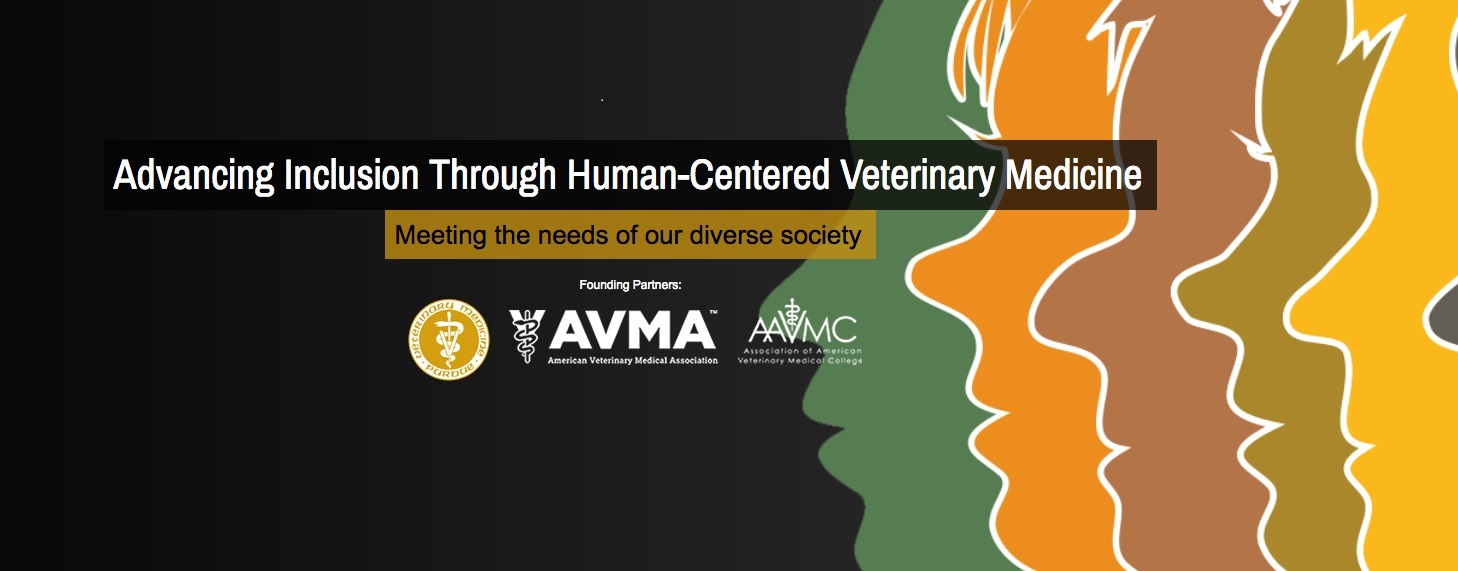
Fostering a diverse and inclusive operating environment in the profession is a key part of helping veterinary medicine provide excellence in professional service and clinical care.
With that goal in mind, the AAVMC Board of Directors has approved $10,000 to help support personnel from AAVMC member institutions participate in the Purdue University Center of Excellence for Diversity and Inclusion in Veterinary Medicine’s professional certificate program.
The AAVMC funding will match one combined $500 registration fee for one faculty member and one staff member at each AAVMC member institution, thereby doubling the number of personnel from each school or college that can participate in the program.
Purdue’s Center of Excellence offers a series of independent certificate programs in Diversity and Inclusion that are specially created for faculty and faculty administrators; interns, residents, and non-faculty educators; staff; students; and veterinarians and veterinary technicians.
The Center for Excellence for Diversity and Inclusion in Veterinary Medicine was established in 2013.
For more information about the certificate program and how to register and obtain funding support, please click here and scroll through the site.
JVME Caught Up, Geared Up for 2019
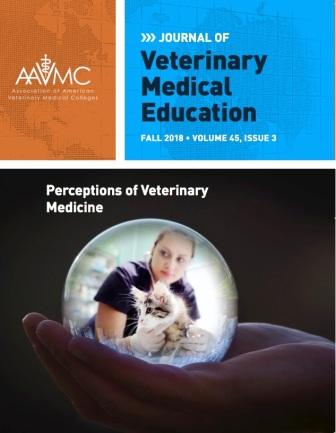 The Journal of Veterinary Medical Education
(JVME) currently has manuscripts in hand for all four 2019 issues and
is caught up after working through a backlog built up over the past
several years.
The Journal of Veterinary Medical Education
(JVME) currently has manuscripts in hand for all four 2019 issues and
is caught up after working through a backlog built up over the past
several years.
JVME is the peer-reviewed academic journal of the AAVMC. As an internationally distributed journal, JVME
provides a forum for the exchange of ideas, research and discoveries
about veterinary medical education. It is available in both print and
online editions.
“Producing the JVME is a major undertaking, but it’s an
unparalleled resource in academic veterinary medicine, and one that goes
to the heart of our mission,” said AAVMC CEO Andrew T. Maccabe.
“Scholarly research grounds veterinary medical educators in
evidence-based practices that elevate the profession and help produce
competent, well-rounded veterinarians.”
Submissions to JVME increased from an annual average of about 150
to about 230 from June 2015 – May 2016, creating a backlog for
reviewers. Reviewers have since caught up and the backlog has eased,
returning to approximately 150 submissions for the year, about half of
which are accepted for publication.
Dr. Daryl Buss, a former president of the AAVMC and former dean of the
University of Wisconsin School of Veterinary Medicine, has served as
Editor-in-Chief since 2013. “The JVME is flourishing under the
leadership of Dr. Buss and we’re fortunate to have a person with his
experience, perspective and capacity in that role,” said Maccabe.
Buss and a 17-member editorial board coordinate the analysis and review of manuscripts. From June 2017 through May 2018, 158 reviewers conducted 344 reviews of JVME manuscripts. The JVME is published by the University of Toronto Press.
The number of manuscripts emerging from academic centers around the
world continues to grow, reflecting the AAVMC’s increased international
orientation. Over the past five years, manuscripts were received from
about 25-27 countries per year. During the 2017-2018 fiscal year,
however, that number rose to 35 countries. Submissions were received
from (in top-10 order) the United States, United Kingdom, Australia,
Iran, Spain, China, the Netherlands, Canada, Turkey, and (tied)
Ireland/India/Denmark.
Users download about 30,000 articles each year. A review on the benefits
of human-companion animal interaction is the most cited JVME article,
and a study on stress and depression among veterinary medical students
is the most read.
Veterinary Profession Releases Statement of Support to Protect, Strengthen Licensure Requirements
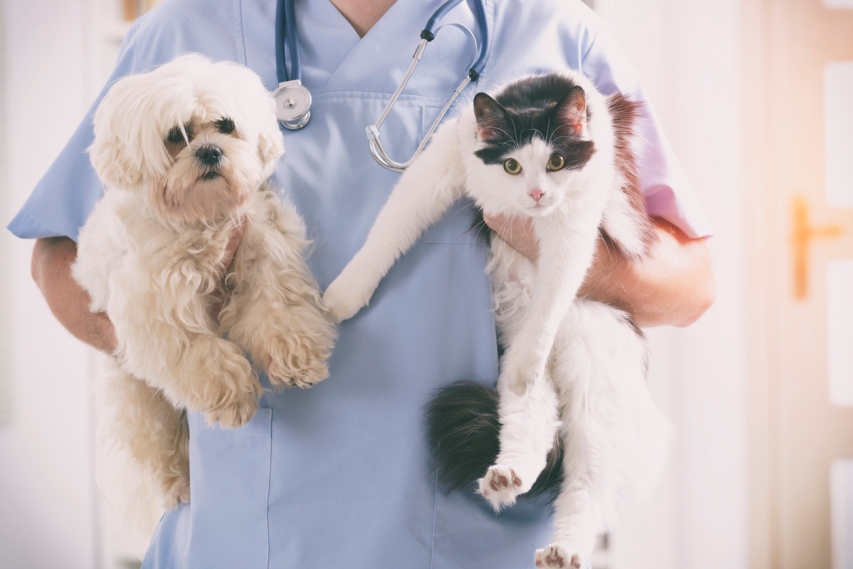 The AAVMC has joined the American Veterinary Medical Association (AVMA), the American Association of Veterinary State Boards (AAVSB), and the National Association of Veterinary Technicians in America (NAVTA) in releasing a joint public statement of support for licensing requirements.
The AAVMC has joined the American Veterinary Medical Association (AVMA), the American Association of Veterinary State Boards (AAVSB), and the National Association of Veterinary Technicians in America (NAVTA) in releasing a joint public statement of support for licensing requirements.
Some activist groups have been attacking state mandated licensing requirements in various professions, claiming overregulation and restriction of competition in the marketplace. The AAVMC believes that professional licensing exists to protect public wellbeing and is particularly important in the health professions, where it ensures high standards of competence and clinical practice.
“Professional licensure goes to the heart of protecting the health and wellbeing of people and animals,” said AAVMC CEO Dr. Andrew T. Maccabe. “It also affects the future development and sustainability of the veterinary medical profession. We appreciate this opportunity to align with our colleagues at the AVMA, the AAVSB, and the NAVTA and make this very important statement to the public.”
Licensing of veterinarians and veterinary technicians ensures veterinary professionals meet established standards of competence through recognized educational programs and successful completion of an examination. Additionally, licensure ensures that veterinarians are properly trained to comply with state and federal regulations.
As part of the profession’s collective efforts to improve licensing, the AAVSB is studying ways to promote uniformity and standardization in licensure – including the development of the Veterinary Application for Uniform Licensure Transfer (VAULT), which provides a centralized process for veterinary regulatory boards to obtain a verified record of a veterinarian or veterinary technician’s credentials.
AAVC Presents First Private Practice Internship Forum
Because the AAVMC and the American Association of Veterinary Clinicians (AAVC) share common interests in academic veterinary medicine, the two organizations work closely together. The AAVC operates the Veterinary Internship and Residency Matching Program (VIRMP), for example, and many of those training programs are located at AAVMC member institutions.
The AAVC maintains a formal liaison position on the AAVMC board of directors, and both organizations are interested in improving the quality of training programs in veterinary medicine. Operating successful clinical internship programs in private practice was the focus of the AAVC’s first Private Practice Internship Forum held recently in Minneapolis.
Almost 50 representatives ranging from practices just beginning to consider establishing an internship training program to practices with 180 interns gathered for the two-day event.
“The impetus for creating the VIRMP Private Practice Internship Forum was to provide an opportunity for internship directors and interested persons from private practice to come together to discuss best practices and issues and challenges specific to private practice internships,” said Dr. Roger Fingland, executive associate dean at The Ohio State University College of Veterinary Medicine, AAVC Liaison to the AAVMC board of directors, and director of the VIRMP. “We were pleased with the attendance and the content and especially the rich discussion that occurred at the Forum.”
Topics covered during the two-day event included a VIRMP overview, AAVMC Internship Guidelines, Didactic Training in Private Practice Internships, Outcomes and Evaluations, Health and Wellness and other areas.
The AAVMC Internship Guidelines, introduced in April 2018, were developed by a working group that included representatives from the AAVMC, AAVC and private practice. They describe minimum standards for veterinary clinical internship programs relative to program design, clinical experience and responsibilities, training environment, work conditions, and program outcomes and reporting. The forum was not specifically convened because of the introduction of the new AAVMC guidelines, Fingland said, but “we certainly wanted a discussion of the guidelines to be a major focus of the forum, and it was.”
Fingland said the goal of the meeting was to provide an opportunity for interested parties to learn more about operating successful internship programs in private practice and provide a forum for discussion. Registrants were invited to submit topics they would like addressed prior to the meeting.
While clinical internship programs originated in academic institutions decades ago, more programs were established in the private sector as the profession developed over the past several decades. Today, the majority are based in the private sector. Approximately 68% of the 940 internships matched during the 2018 VIRMP were in private practice, Fingland said.
The AAVMC has plans to present a similar event in the future. In a post-forum survey of attendees, Fingland said, 100% described the Forum as valuable and indicated they would like to see it repeated. Approximately 50% wanted the Forum to occur every year and 50% wanted the Forum to occur every two years.
AAVMC Establishes Relationship with Association of Veterinary Advancement Professionals
 The AAVMC and the Association of Veterinary Advancement Professionals (AVAP) have signed a Memorandum of Understanding that creates a formal relationship between the two organizations. Under the terms of the agreement, the AAVMC will provide meeting management services, maintain AVAP’s financial accounts and conduct their business operations.
The AAVMC and the Association of Veterinary Advancement Professionals (AVAP) have signed a Memorandum of Understanding that creates a formal relationship between the two organizations. Under the terms of the agreement, the AAVMC will provide meeting management services, maintain AVAP’s financial accounts and conduct their business operations.
Established in 1998 from a prior group of fundraising officers, AVAP is an organization of about 150 fundraising, communication and alumni relations professionals working in academic veterinary medicine. The group organizes an annual meeting and continuing education conference held in conjunction with the AVMA Annual Convention.
“Institutional advancement plays a vital role in the success of our member colleges and schools,” said AAVMC CEO Dr. Andrew T. Maccabe. “AVAP professionals build understanding and support for academic veterinary medicine among a broad range of stakeholders in both the public and private sectors, locally and nationally. That facilitates philanthropic contributions as well as government appropriations, and it helps develop political support at the state and federal levels. This is a very important relationship for us to establish and we’re looking forward to the collaboration.”
Creating a formal linkage between the two organizations makes a great deal of sense, since advancement officers work very closely with the deans at AAVMC member institutions, who comprise the AAVMC Assembly.
“We’re very excited about the opportunity provided by the AAVMC and are honored to become a component of this prestigious organization,” said AVAP President Danielle R. Johnson, senior director of development for The Ohio State University College of Veterinary Medicine. “We’ve grown a great deal in recent years, and the professional and administrative support provided by the AAVMC is going to help us become more effective at what we do.”
In the late 1990’s and early 2000’s the AAVMC operated an Advancement Committee that included three deans and three AVAP representatives. The committee’s goal was to examine strategies for helping AAVMC institutions develop more successful fundraising and communications programs.
That followed action taken by AAVMC Director of Communications Jeff Douglas to organize AVAP and arrange programming focused on the importance of communications and fundraising for deans at several AAVMC and AVAP conferences. Over the past 20 years, deans have more fully embraced their responsibilities as “chief external relations officers” and more broadly staffed advancement operations within their organizations.
Over the past five years, the AAVMC has created two professional recognition awards within the institutional advancement area: the AAVMC Communications Excellence Award and the AAVMC Scholarship Fundraising Excellence Award. The new arrangement enables the AAVMC to provide increased support for this important part of academic veterinary medicine and explore opportunities for continued enhancement of the function within its member institutions.
Remembering LSU-SVM Dean Peter Haynes
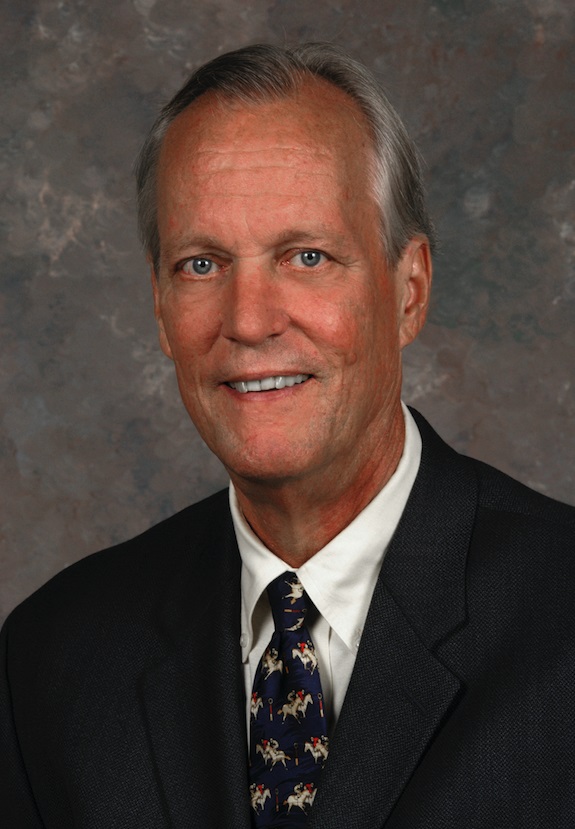 The life and legacy of former Louisiana State University School of Veterinary Medicine (LSU-SVM) Dean Dr. Peter Haynes was celebrated during a ceremony in Baton Rouge held on Friday, August 24. Haynes passed away unexpectedly in late June.
The life and legacy of former Louisiana State University School of Veterinary Medicine (LSU-SVM) Dean Dr. Peter Haynes was celebrated during a ceremony in Baton Rouge held on Friday, August 24. Haynes passed away unexpectedly in late June.
Haynes worked at the LSU-SVM as a faculty member and administrator for more than 40 years, including tenure as dean from 2007-2014. He served on the board of directors of the AAVMC, including a term as Treasurer. He also served in the AVMA House of Delegates for 17 years and was honored with the 2008 AVMA Award, that association’s highest award.
Haynes earned his DVM degree from Colorado State University in 1969 and was a diplomate in the American College of Veterinary Surgeons (ACVS). Haynes was also a former president of the American Association of Equine Practitioners (AAEP).
Remarks were shared during the ceremony by several friends and colleagues. Those included the Kenneth F. Burns Chair in Veterinary Medicine and Dean of the LSU-SVM Dr. Joel D. Baines, LSU-SVM Dean Emeritus Dr. Michael Groves, and The Ohio State University College of Veterinary Medicine Dean Dr. Rustin Moore.
The Dean Peter F. Haynes Equine Award has been established by the LSU Foundation in his honor.
AVMA Introduces MyVeterinaryLife.com
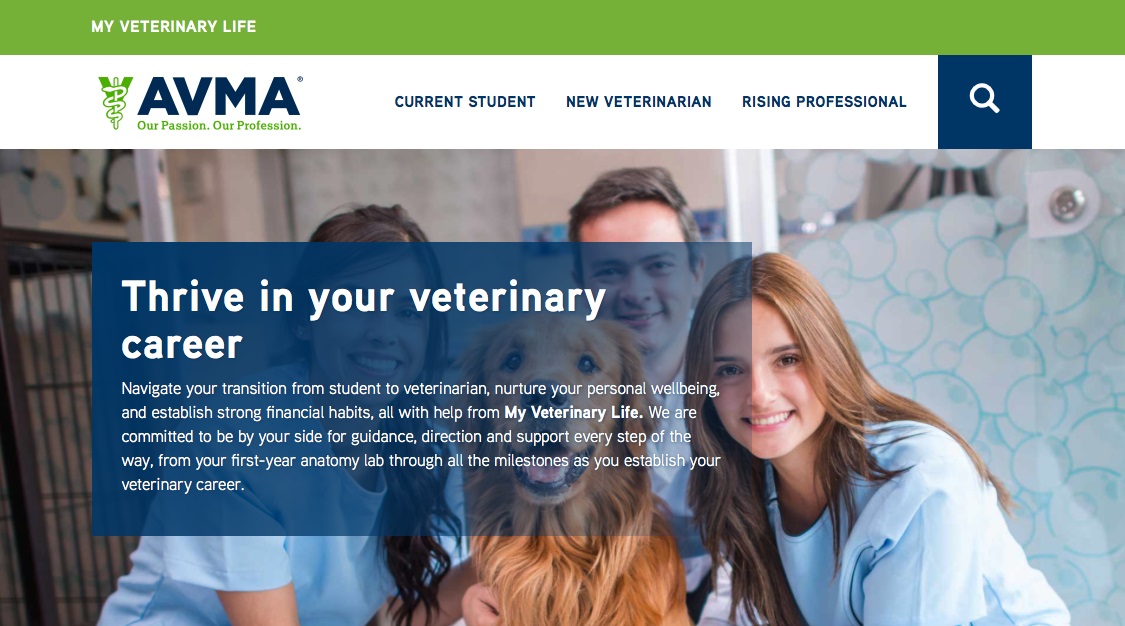 The AVMA has introduced a new website titled “My Veterinary Life.com,” which contains helpful guidance and advice for students and young professionals. The website provides tools and resources that support three areas of critical importance to students and early-career veterinarians: career development, financial health, and wellbeing.
The AVMA has introduced a new website titled “My Veterinary Life.com,” which contains helpful guidance and advice for students and young professionals. The website provides tools and resources that support three areas of critical importance to students and early-career veterinarians: career development, financial health, and wellbeing.
The site contains helpful information on everything from finance and educational debt to career planning and development, managing stress in the workplace and fostering health and wellbeing.
The goal of the site is to help the next generation of veterinarians succeed and thrive with the help of specially developed resources, guidance and support.
VetCAN Career Fair October 27
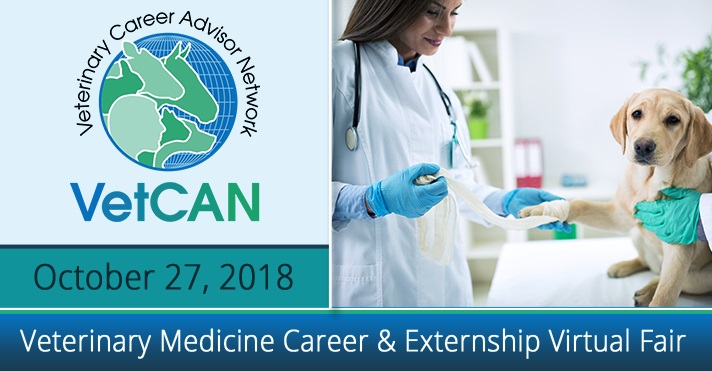 The Veterinary Career Advisor Network (VetCAN) will present a Virtual Career Fair on October 27, 2018.
The Veterinary Career Advisor Network (VetCAN) will present a Virtual Career Fair on October 27, 2018.
The VetCAN Virtual Career Fair provides a forum for employers to identify top quality candidates and it provides job-seeking students and alumni from AAVMC member institutions with the ability to review job opportunities from their desktop or mobile device.
During the last VetCAN Virtual Fair held in March 2018 there were over 330 job seekers and 100 employers registered. For more information about how to participate in the October event, click here.
The Veterinary Career Advisor Network (VetCAN) is an AAVMC-affiliated organization founded in 2014 as a resource and network for career and professional development professionals working with veterinary students and alumni in AAVMC member institutions.
The group includes representatives from several AAVMC member institutions and welcomes career professionals who are working with students, alumni and prospective employers in veterinary medicine.
Their goal is to provide career development advising assistance for students, build and maintain relationships with employers, and help facilitate meaningful relationships between alumni and students.
In the News
A New Vet School Professors Don’t Want
Inside Higher Education
Experimental Brain Cancer Treatment For Dogs Could One Day Help Humans
CBS National News
One Health Vision Inspires Veterinary Medicine at City University of Hong Kong
Inside Higher Education
East Tenn. Doctors Explain Rare Deadly Infection Linked to Dog Saliva
ABC-WATE
NIH Awards UF Veterinarian Five-year Grant to Study Canine Diabetes
Veterinary Practice News
Kansas State University Experts Confront African Swine Fever in Asia
Veterinary Practice News
Scientists Develop Alternative Treatment for Peripheral Artery Disease
Phys.org
Why Whooping Cough is Making a Comeback
Atlanta Journal Constitution
Iowa State University Scientists Study How Malaria Parasites Take Over Human Red Blood Cells
Health Canal
OSU Enrolling Dogs with Mammary Cancer for Clinical Trial
Veterinary Practice News
New Diabetes Therapy Shows Promise for Reversal in Humans, Dogs
Indiana Ag Connection
Antibiotics Resistance: From Animals to People
Farms.com
Veterinary Groups Support Protecting, Strengthening Licensure Requirements
Veterinary Practice News
New Technique Studied for Treating Cancer in Cats
Herald Review
USask Veterinary College to Operate Canada’s First PET-CT for Animals
Academica Group
High Hopes on Vets’ School
The Standard Hong Kong
Saving the Brain With a New Nerve Agent Antidote
CNBC
Happy State Bank to Donate $2.5M to Texas Tech School of Veterinary Medicine
KTXS
Iowa State University Scientists Study How Malaria Parasites Take Over Human Red Blood Cells
Health Canal
OSU Enrolling Dogs with Mammary Cancer for Clinical Trial
Veterinary Practice News
Purdue Chosen To Lead Global Health Project With $70M In Federal Funds
WIFU
From Our Members
3-D Surgery a Game Changer for Veterinary Surgery at the University of FloridaUniversity of Florida
Ebola Species Found in Bats Ahead of Any Potential Outbreak
UC Davis
Animals as a Gateway to Science
Tufts University
Yeager the Miracle Dog: CSU Veterinary Team Gives Beloved Lab Another Chance at Life
Colorado State
One Health Research Foundation Announces Inaugural Board of Directors
Ross University
Purdue Veterinary Medicine’s This is How We “Role” program receives INSIGHT Into Diversity
Magazine’s 2018 Inspiring Programs in STEM Award
Purdue University
Veterinary College Scientist Awarded NIH Grant to Study Infectious Disease
Virginia-Maryland
Hoffsis Receives Meritorious Service Award from the American Veterinary Medical Association
Lincoln Memorial University
People in Motion
“Like” us on Facebook or follow us on Twitter:




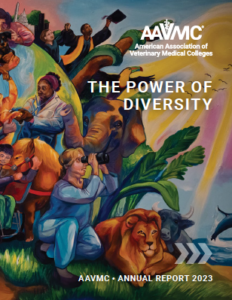
SHARE